Search Results
Showing results 41 to 60 of 63
Cycles in the Cards
Source Institutions
In this "game," learners explore and relate the evolution of stars to a Navajo creation story. The story is written on a series of cards, which are laid on a table as the story is told.
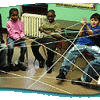
Web of Life Game
Source Institutions
In this game, learners each represent a different organism in an environment. They build a web during the activity, and discover how all the players in an ecosystem depend on each other.

Polyatomic Ion Bingo
Source Institutions
This activity was designed for blind learners, but all types of learners can play this game to learn about the major polyatomic ions (an ion that consists of two different elements).
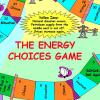
Energy Choices Board Game
Source Institutions
This board game teaches learners about energy decision making. Players select cards that determine the transportation and home design that will influence their expenses as they play.

An Interdisciplinary Deer and Human Population Study
Source Institutions
This activity helps the learner answer the question: "What environmental problems arise due to animal and human overpopulation and what might need to be done to combat these problems?" Learners play a

Sound Off!
Source Institutions
This activity includes several games about animal sounds. Using their sense of hearing and communicating with various kinds of noisemakers, learners role-play predator and prey.

Puzzled Partners
Source Institutions
In this web-based activity, learners try to figure out who in an online chat room has their matching puzzle piece.
Tree Poker
Source Institutions
In this activity (p.14-15 of PDF), learners discover the concepts of competition and limiting factors as they relate to plant and animal communities.

Exploring Fabrication: Self-Assembly
Source Institutions
In this activity, learners participate in several full-body interactive games to model the process of self-assembly in nature and nanotechnology.
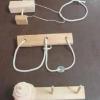
Topological Puzzles
Source Institutions
In this activity, learners construct three math puzzles out of simple materials like wood, string, and Styrofoam.
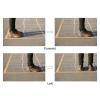
Kidbots
Source Institutions
In this activity, one person acts as a human robot while another acts as their developer by programming their actions.
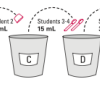
A System of Transport
Source Institutions
In this activity about the human heart (on page 5 of the PDF), learners work in teams to simulate the volume of blood moved through the circulatory system by transferring liquid into--and through--a s

Mating Game
Source Institutions
In this game (on pages 14-21), learners explore how each human being inherits genetic traits such as eye color.

What am I?
Source Institutions
In this activity, learners examine nanoscale structures of common things.

Frog Olympics
Source Institutions
Did you know that a bullfrog can jump a distance of 10 times its body length? Learn more about nature's most acrobatic amphibian, the frog, through this set of short, hands-on activities.
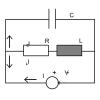
Wire Maze
Source Institutions
Learners create an electrical-circuit maze out of wire, then try to pass a paperclip through the maze without touching the wire.

Whatta Web
Source Institutions
In this activity, learners play a game to simulate the food chain.

A Balancing Act
Source Institutions
In this plant science activity, learners role play as vegetables and weeds competing for nutrients.

Toss a Score!
Source Institutions
In this math game, learners toss plastic cups to land just right and collect points to win.

Survivors! The People of the Arctic
Source Institutions
In this activity, learners use maps to locate the Arctic region and use a word game to discover the types of resource people need to survive in the extreme climate.
